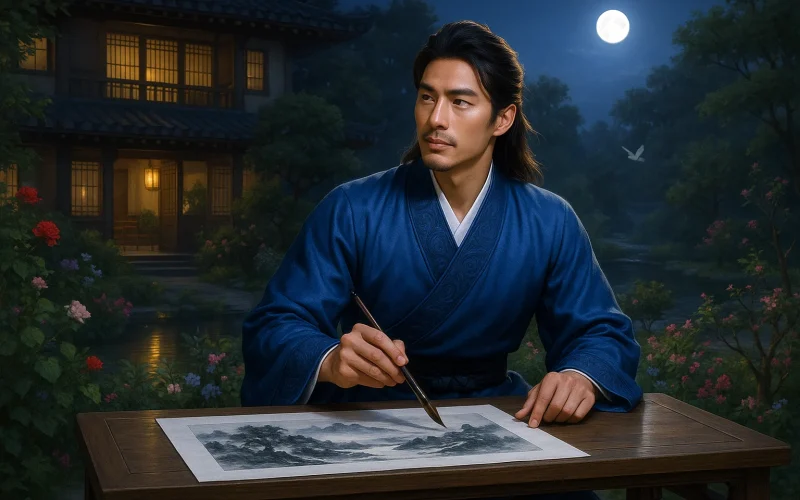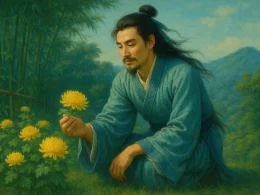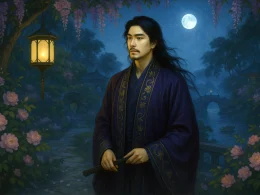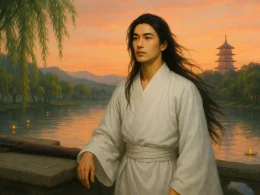Liu Fangping (刘方平 c. 742 – c. 785), a native of Luoyang in Henan. A recluse-poet and painter spanning the High to Mid-Tang period, he distinguished himself with a delicate and subtle poetic style skilled in depicting boudoir lament and moonlit nights. Though only 26 of his poems survive in the Complete Tang Poems, works like Moonlit Night and Spring Lament secured his place in the canonical hall of Tang poetry. Hailed as "the pure voice of the High Tang and the herald of the Mid-Tang," his poetry fused the lucidity of the Qi-Liang style with Zen serenity, profoundly influencing the later ci lyric tradition and Heian-era Japanese women's literature.
Major Works
Life
Liu Fangping descended from the Xiongnu aristocratic Liu clan of the Northern Wei. His grandfather Liu Zheng and father Liu Wei both served as regional prefects under the Tang, belonging to the middle-tier scholar-official class. During the Tianbao era (742–756), he witnessed the Tang's transition from zenith to decline yet chose a path divergent from his contemporaries.
Unlike most High Tang poets who pursued official careers, after briefly failing the imperial exams in his youth, Liu abandoned official pursuits entirely and retreated to the banks of the Ying and Ru rivers (modern Xuchang and Ruzhou in Henan). The Biographies of Talented Tang Poets describes him as "living in seclusion in the Grand Valley of Yangyang, noble and without office," associating with recluses like Yuan Dexiu and Huangfu Ran. This choice was not mere escapism but a redefinition of scholar-official values post-An Lushan Rebellion—as expressed in his poem To Administrator Yan VIII: "From afar, I imagine Luoyang as the Peach Blossom Spring; / The world's affairs, vast and obscure, are unknowable."
A poet-painter, he excelled at landscapes, pines, and rocks; Zhang Yanyuan's Record of Famous Painters Through the Ages rated his works "top-grade for exquisite technique." This dual artistic identity deeply influenced his poetry, forming a unique "painting within poetry, Zen within painting" style. He died around the early Zhenyuan era (c. 785) in his retreat. His epitaph remains undiscovered, and biographical details are largely lost, echoing his line: "Ten thousand shadows are born of the moon, / A thousand voices each become autumn"—a presence clear yet elusive as moonlight.
Artistic Achievements
Metaphysics
Liu reconfigured the spatiotemporal expression paradigm of Tang poetry. In his masterpiece Moonlit Night, he creatively transforms physical space-time into perceptual space-time:
"Deeper night, moonlight bathes half the homes, / The Dipper slants, the Southern Stars tilt. / Tonight I sense the spring warmth's touch, / Insect songs newly pierce the green window gauze."
The poem constructs a geometry of light and shadow with "moonlight bathes half the homes"; astral movements (Dipper, Southern Stars) metaphorize time's flow; finally, the auditory breakthrough of "insect songs" completes the perceptual loop from cosmic vastness to microscopic life. This philosophy of "knowing spring through the tiny" predates Blake's "see a world in a grain of sand" by a millennium.
His Boating on an Autumn Night pushes spatial sensation further:
"Night on wooded ponds, the boat glides, / Insect hums, rustling reeds whisper. / Ten thousand shadows are born of the moon, / A thousand voices each become autumn."
Through quantified description "ten thousand shadows / a thousand voices," he deconstructs the autumn night into a field of light and sound vibrations, revealing the poet's Zen insight into material essence.
Psychology
Liu transcended the stereotypical expression of traditional boudoir laments, pioneering psychological realism. Spring Lament is acclaimed as "the model of psychological depiction in Tang poetry":
"Sunset through gauze windows, dusk approaches, / In the golden room, none see tear stains. / Deserted courtyard, solitude, spring soon ends, / Pear blossoms blanket the ground, door unopened."
The chain of images "gauze window - dusk - golden room - tear stains - deserted courtyard - pear blossoms," through dual oppression of spatial enclosure (closed door) and temporal decline (ending spring), visualizes female psychological distress. Compared to Wang Changling's social complaint ("regret teaching my husband to seek titled glory"), Liu focuses more on dissecting inner emotions, directly influencing Wen Tingyun's subtle style ("Layered hills, gold shimmering extinguished").
Spring Lament (on behalf of…) displays his narrative talent:
"Dawn's lingering orioles weep with the lady, / Drawing the curtain, only lush grass seen. / Sometimes the east wind enters the courtyard, / Willow tendrils all lean westward."
The image of "willows leaning west"暗示 the direction of the absent warrior; this implicit politics of direction carries greater emotional tension than direct lyricism.
Visual Aesthetics
As a poet-painter, Liu integrated painting techniques into poetry. In Farewell, "Mountain moon lingers at dawn, / Forest breeze cool, unceasing" evokes an ink wash scroll, creating emptiness through "leaving blank" technique; Lotus Picking Song "Setting sun on clear river, / Jing songs, slender Chu waist" resembles a vivid court lady painting, its coloring technique directly influencing Li He's lush style ("pink cloud sash, lotus silk skirt").
Japanese scholar Iritani Sensuke notes in Visuality in Tang Poetry: high-frequency visual terms in Liu's poetry—"moon," "window," "gauze," "shadow"—constitute the core of his "poetics of transparency." This pursuit echoes his painter identity. Though authenticity is doubtful, a purported Song copy of Liu Fangping's Pines and Rocks in Boston's MFA attests to his intermedial influence.
Influence
Canonization Process
In the Tang, Liu was a non-mainstream poet, absent from the Anthology of Heroic Spirits of Rivers and Mountains. The Northern Song anthology Tang Poems of Zeal first included Moonlit Night; Ming compiler Gao Bing's Tang Poetry Classification ranked him as a "transitional" poet, praising his "lucidity, subtlety, depth, opening a distinct path." Exclusion from the Qing 300 Tang Poems made him a "secret treasure" among literati—Yuan Mei's Random Notes on Poetry acclaimed Spring Lament: "Twenty-eight characters like crystal curtain shadows, exquisitely transparent."
True canonization occurred in the 20th century. Wen Yiduo's Essays on Tang Poetry called him "washing away the High Tang's clamor with moonlight"; Canadian sinologist Stephen Owen dedicated a section in The Great Age of Chinese Poetry to analyzing his "microcosmic poetics"; Japanese Nobel laureate Kenzaburō Ōe repeatedly quoted "ten thousand shadows are born of the moon" in The Flaming Green Tree, seeing it as the essence of Eastern aesthetics.
Transcultural Influence
Liu is among the few Tang poets influencing Western modern poetry. American Imagist Amy Lowell imitated Moonlit Night in Fir-Flower Tablets, transforming its light-shadow technique into "The moonlight cuts the house in two"; French composer Olivier Messiaen drew on Spring Lament for his piano suite The Court of Pear Blossoms.
In East Asia, his poems entered aesthetic systems early. Japan's Japanese-Chinese Recitation Anthology included "Tonight I sense the spring warmth's touch"; Korean Joseon scholar Jeong Yakyong's Complete Works of Yodang used "insect songs pierce the window" to argue for the universality of "investigating things and extending knowledge"; in the contemporary Hong Kong film In the Mood for Love, Maggie Cheung's window-gazing shot composition echoes Spring Lament's visual aesthetics.
Academic Research
Recent research shows multidimensional breakthroughs: Fudan University's digital analysis revealed his frequent use of adverbs like "pierce," "particularly," "newly," forming a unique "poetic language of uncertainty"; archaeologists discovered fragments of "green window gauze" at a Tang courtyard site in Luoyang, confirming the material reality of his descriptions; the Supplement to Complete Tang Poems uncovered new exchange poems with monk Jiaoran, illuminating his Zen origins.
This poet of only 26 surviving poems is like the autumn sound he described: "a thousand voices each become autumn"—though the volume is tiny, each constitutes a complete universe. In today's dialogue between globalization and locality, Liu Fangping's Eastern wisdom of "seeing eternity in the minute" finds unprecedented resonance.
























